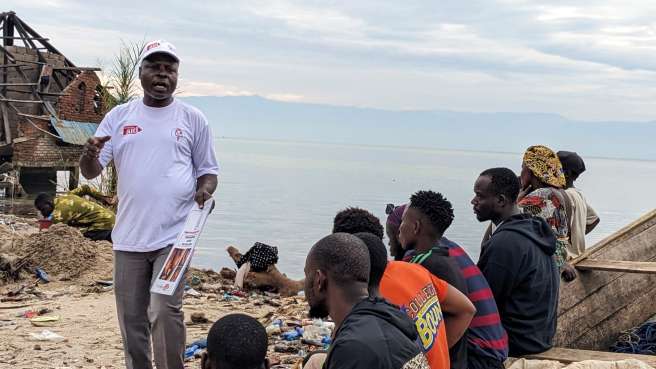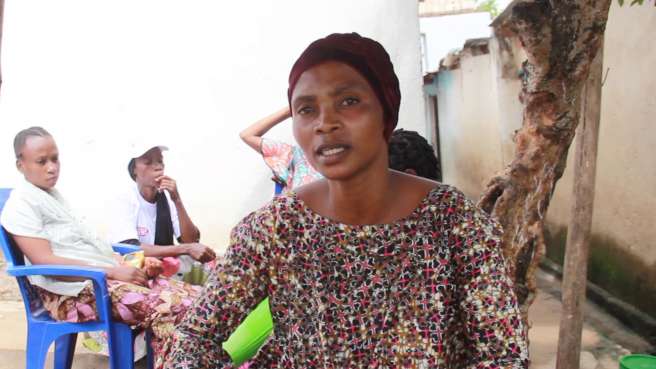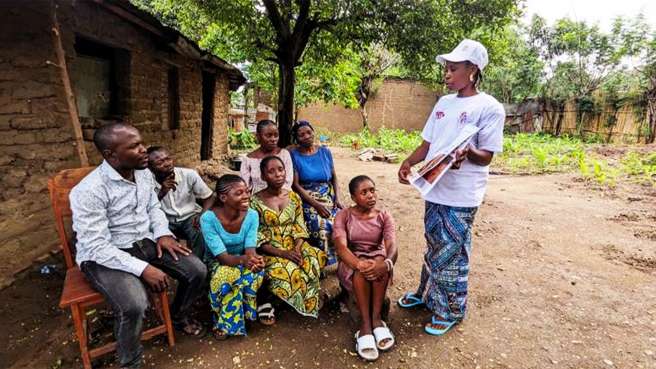An Mpox outbreak swept across Africa last year, with over 72,000 cases reported, the overwhelming majority of them in the Democratic Republic of the Congo (DRC). Mpox is contagious and spreads mainly through close contact. People can catch Mpox from contaminated clothes and linen as well as catch it when cooking and eating meat from infected animals. It often causes a fever and rash which then develops into painful lesions. In some cases it can be deadly, killing around 2.5 percent of people infected in DRC.
Cases continue to accumulate in DRC and South Kivu province in the country’s east had the highest number of cases in the country in November.
With funding from Christian Aid, staff from our local partner Communaute Baptiste au Centre De L’Afrique (CBCA) are holding awareness raising sessions with support from 120 community health workers to reach 6,000 people with information on the steps they can take to prevent catching and spreading Mpox.
One of these health workers is 56-year-old Mahumba Ndera Remy, who works for the local health office in Uvira in South Kivu. Mahumba explained some of the challenges in responding to the outbreak.
“Many people believe it is witchcraft while others claim that the disease does not exist,” Mahumba said.
“In DRC, there is unfortunately a stigma around people who have caught Mpox. Some families abandon those affected. Others think that those who have contracted the disease are already beyond help, effectively considering them dead.”
Mahumba explained that personal loss was a key reason why he put himself forward to lead the awareness raising sessions.
“We have lost family members and neighbours because of this disease. I lost a colleague to Mpox because he wasn’t informed, didn't take any precautions, didn’t see a doctor and instead relied on traditional healers.”
Image credits and information

DRC is among the five poorest countries in the world. Nearly 26 million people, five times the size of the population of Ireland, are experiencing a food crisis. Almost two thirds of the population lack basic access to water and nearly 9 out of 10 people do not have proper sanitation.
Eastern Congo is also plagued by armed conflict and high levels of forced displacement, with many living in cramped displacement camps - prime conditions for the disease to spread.
According to Mahumba, poverty is a key barrier in people’s ability to counteract the spread of Mpox in Uvira.
“Many residents live on less than $1 a day and do not have the time to inform themselves about Mpox as they spend most of their time trying to find something to eat,” Mahumba said.
“Many people are also unable observe sanitary measures, often due to poverty. Poverty also forces some people to eat bush meat,” he added.
While communities like Uvira face an uphill struggle in curbing the spread of the disease, Mahumba is hopeful that things will get better, and that awareness raising sessions such as those run by Christian Aid’s local partner are playing a key role in this.
“Before receiving information, people tell us that they see Mpox as a dangerous disease but they don't yet know how to protect themselves,” Mahumba said.
“These awareness raising sessions are crucial because they help people understand the severity of the disease, the ways it can be contracted and preventive measures to avoid infection. This is crucial to ensure the community can take the necessary steps to protect themselves and others,” he added.
37-year-old mum of three Heri Asasa and 20-year-old student Sarah Francine both took part in in the awareness raising sessions run by CBCA. Both of their families have no running water at home and in Heri’s case, she is forced to rely on fetching water from the nearby river and Lake Tanganyika. Seeing the effects of Mpox up close prompted both women to take part. Heri’s brother contracted the disease, while a child of Sarah’s neighbour also got infected.
Image credits and information

“All Uvira is shaken by this deadly disease. It’s becoming worse in Uvira, the cases are visible. The photos circulating on WhatsApp of people we know worry us even more,” Heri said.
“A neighbor’s child was affected by the disease but we did not have information about how he contracted it and we were fearful. I was motivated to come here to know how to protect myself,” Sarah added.
Through the awareness raising sessions, both women were able to learn more about the disease and feel more confident in being able to safeguard themselves and their families from it.
“I have learned through the awareness sessions that I need to regularly and properly wash my hands. I should cook meats thoroughly before eating them. I have to avoid contact with people showing signs of the disease and have learned that it is necessary to isolate a person with Mpox, identify their contacts and monitor them. I didn't know these measures before,” Heri said.
Heri added that the preventive steps she has learned have been particularly important as affording to see a doctor is out of reach when any of the family fall ill.
“We now know how to protect ourselves against Mpox. It is important that others in the community can participate so that they too know the magnitude of the disease and the preventive measures,” said Sarah.
Since taking part in the sessions, Sarah has committed herself to spreading what she has learned to others in her community.
Image credits and information

To help further curb the spread of Mpox, CBCA are also providing kits to 15 schools and churches containing items including soap and jerrycans for collecting and storing water for handwashing, benefiting 4,500 people.
With 95% percent of the population Christian, Mahumba also wants churches to play a more active role in curbing the disease.
“Churches in DRC have a significant role to play in addressing the spread of Mpox. Many ministers often refer to it as a sign of the end times, while it is actually a real disease. Awareness campaigns within churches can reach large audiences quickly, effectively spreading preventive messages and educating the community,” he said.
We'll use your donation to help families around the world to overcome poverty and injustce, whereve the need is greatest.
